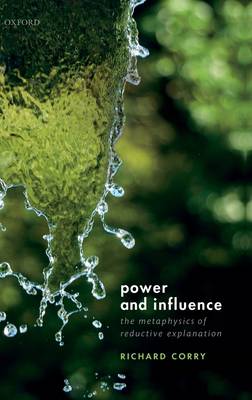
- Afhalen na 1 uur in een winkel met voorraad
- Gratis thuislevering in België vanaf € 30
- Ruim aanbod met 7 miljoen producten
- Afhalen na 1 uur in een winkel met voorraad
- Gratis thuislevering in België vanaf € 30
- Ruim aanbod met 7 miljoen producten
Zoeken
€ 177,45
+ 354 punten
Omschrijving
The world is a complex place, and this complexity is an obstacle to our attempts to explain, predict, and control it. In Power and Influence, Richard Corry investigates the assumptions that are built into the reductive method of explanation--the method whereby we study the components of a complex system in relative isolation and use the information so gained to explain or predict the behaviour of the complex whole. He investigates the metaphysical presuppositions built into the reductive method, seeking to ascertain what the world must be like in order that the method could work. Corry argues that the method assumes the existence of causal powers that manifest causal influence--a relatively unrecognised ontological category, of which forces are a paradigm example. The success of the reductive method, therefore, is an argument for the existence of such causal influences. The book goes on to show that adding causal influence to our ontology gives us the resources to solve some traditional problems in the metaphysics of causal powers, laws of nature, causation, emergence, and possibly even normative ethics. What results, then, is not just an understanding of the reductive method, but an integrated metaphysical worldview that is grounded in an ontology of power and influence.
Specificaties
Betrokkenen
- Auteur(s):
- Uitgeverij:
Inhoud
- Aantal bladzijden:
- 256
- Taal:
- Engels
Eigenschappen
- Productcode (EAN):
- 9780198840718
- Verschijningsdatum:
- 25/09/2019
- Uitvoering:
- Hardcover
- Formaat:
- Genaaid
- Afmetingen:
- 157 mm x 236 mm
- Gewicht:
- 521 g

Alleen bij Standaard Boekhandel
+ 354 punten op je klantenkaart van Standaard Boekhandel
Beoordelingen
We publiceren alleen reviews die voldoen aan de voorwaarden voor reviews. Bekijk onze voorwaarden voor reviews.











